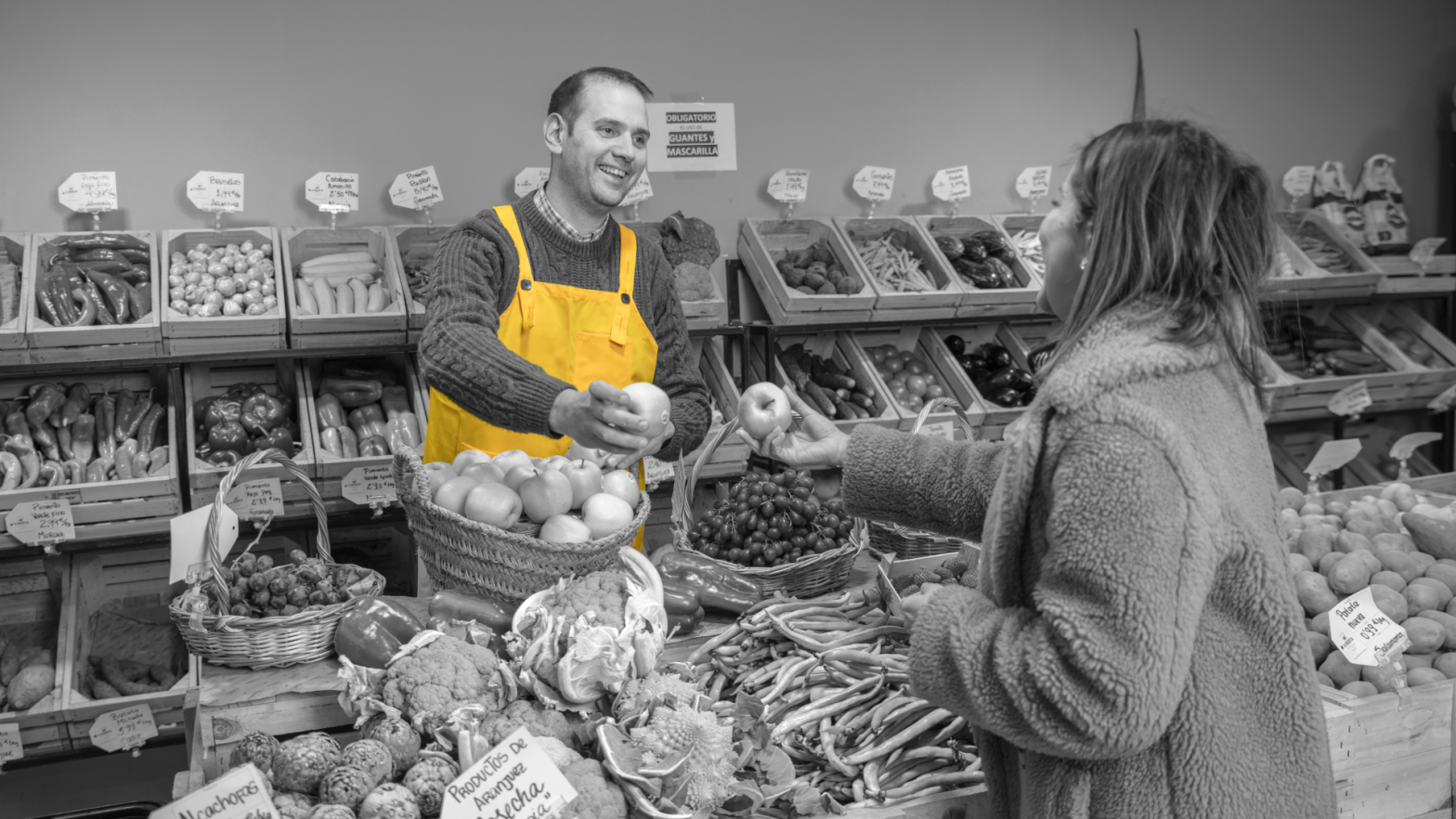When I was still living in Germany, every weekend I would see the opening of the vegetable and fruit market through my window. It attracted quite a large number of people from early in the morning. No wonder, after all; the goods sold by local vendors were healthier, fresher and cheaper than those in the supermarkets, where I used to shop for myself. Fear of conversation, not knowing the names of fruits and vegetables in German and the lack of self-service checkouts held me back for a long time, but one day I decided to break through.
On my first visit to the market, I stressed too much and the only word I could remember at the time was der Apfel, or apple. So I bought a couple of apples and promised myself that I would go back there next weekend and learn more vocabulary by then. I found the motivation to do so increased my vocabulary from week to week, and suddenly weekly shopping at the market began to give me great satisfaction. I saw how quickly I was making progress, and in a short time I had mastered all fruits and vegetables in German. If, like me, you enjoy cooking healthy meals and fruits and vegetables are a big part of your diet, I strongly encourage you to shop at the markets.
In this article, you’ll learn vocabulary and tips that will prepare you for conversations with local vendors. Let’s get started!
Fruit in German – das Obst
Let’s start with fruit. The words das Obst and die Früchte both mean “fruit”. However, there is a difference between the two. The word das Obst (fruit) is a collective term and is not plural. It is a more general and uncountable concept. For example, we will use it in the sentence Ich esse gern Obst (I like to eat fruit) or Obst ist gesund (Fruit is healthy). In contrast, the word die Frucht (fruit) is countable, and thus has the plural die Früchte (fruit). It can mean fruit in the sense of “harvest” or specifically fruit as part of a plant, e.g. Der Apfel ist die Frucht des Apfelbaumes (The apple is the fruit of the apple tree). In colloquial speech, Germans often treat these words as synonyms.
In this article, I have highlighted five types of fruits. These are:
| German | English |
|---|---|
| die Zitrusfrüchte | citrus |
| die Steinfrüchte | stone fruits |
| das Beerenobst | berries |
| die exotischen Früchte | tropical fruits |
| das Kernobst | pome fruit |
Remember that more than 90% of fruit names have the article die (in the following list you will find only three fruits with the article der). This will make it easier for you to use fruit names in sentences later.
Citrus – Zitrusfrüchte
Citrus is a group of fruits that are known worldwide for their health benefits. Although the climate in Germany is not conducive to growing citrus on a large scale, they are highly valued both for their flavor and as a source of vitamins and antioxidants.
| German | English |
|---|---|
| die Zitrusfrüchte | citrus |
| die Grapefruit | grapefruit |
| die Limette/Limone | lime |
| die Mandarine | tangerine |
| die Orange | orange |
| die Pomelo | pomelo |
| die Zitrone | lemon |
Stone fruits – Steinfrüchte
Fun fact: German Christmas markets (especially in Franconia and Bavaria) sell so-called Pflaumentoffel, which are people-shaped confections made of roasted plums (Männlein aus Backpflaumen). They are about 15 cm high and depict chimney sweeps, kings or fairy tale characters.
| German | English |
|---|---|
| die Steinfrüchte | stone fruits |
| die Mirabelle | mirabelle plum |
| die Nektarine | nectarine |
| der Pfirsich | peach |
| die Pflaume | plum |
| die Marille/Aprikose | apricot |
| die Olive | olive |
| die Kirsche | cherry |
| die Süßkirsche | sweet cherry |
| die Kokosnuss | coconut |
Berries – Beerenobst
Notice that all the names of the fruits below consist of two parts. The second is always die Beere, meaning berry! Exception: die Weintraube – grape.
| German | English |
|---|---|
| das Beerenobst | berry |
| die Erdbeere | strawberry |
| die Himbeere | raspberry |
| die Blaubeere | blueberry |
| die Brombeere | blackberry |
| die Weintraube | grape |
| die Johannisbeere | currant |
| die Stachelbeere | gooseberry |
| die Moosbeere | cranberry |
Tropical fruit – exotische Früchte
In Germany, despite the cooler climate, tropical fruits are readily available year-round thanks to an extensive import network. Grocery stores offer a wide selection of exotic fruits that come from countries with warmer climates.
| German | English |
|---|---|
| exotische Früchte | tropical fruits |
| die Ananas | pineapple |
| die Avocado | avocado |
| die Banane | banana |
| die Dattel | date |
| die Drachenfrucht | dragon fruit |
| die Feige | fig |
| die Kiwi | kiwi |
| die Litschi | lychee |
| die Mango | mango |
| die Papaya | papaya |
Pome fruit – Kernobst
Pome fruits are those with small seeds inside, and the edible part is the flesh – such as apples, which are the most widely grown fruits in Germany. Apples account for about 70% of all fruit species grown in the country.
| German | English |
|---|---|
| das Kernobst | pome fruit |
| der Apfel | apple |
| die Birne | pear |
| die Quitte | quince |
| der Granatapfel | pomegranate |
The list of fruits and vegetables in German is quite large, and you will need some time to learn the new vocabulary by heart. At first, focus on learning those ingredients that appear most often in your diet. A great exercise would be making a shopping list or reading and writing down recipes in German. For more on language learning methods, see our article on how language is learned by polyglots.
In the Taalhammer app you have the ability to create your own collections for learning. This will help you learn vocabulary words that will really come in handy in everyday life, which is a key part of mastering a foreign language. Write down the vocabulary you want to learn, and our algorithm will prepare a repetition system that suits your needs. Start learning German today, and you’ll soon feel yourself reaping the sweet fruits of your labor!
Vegetables in German – das Gemüse
Germany is the world leader in the production and consumption of organic vegetables. It’s hard to find vegetables without the “eco” label in stores there. More and more farms in the country are switching to organic farming methods, abandoning chemical pesticides and artificial fertilizers in favor of natural, environmentally friendly solutions. For Germans, organic vegetables are not just a matter of healthy living, but also an expression of concern for the future of the planet and a concern for the quality and taste of the food they eat.
Let’s now move to a German health food market and take a look at the types of vegetables that can be found there:
| German | English |
|---|---|
| das Wurzelgemüse | root vegetables |
| das Fruchtgemüse | fruit vegetables |
| das Knollengemüse | tuber and allium vegetables |
| das Blütengemüse | flower vegetables |
| das Blattgemüse | leafy vegetables |
| die Hülsenfrüchte | legumes |
Root vegetables – Wurzelgemüse
Root vegetables are plants whose edible parts grow underground, in the form of roots or tubers.
| German | English |
|---|---|
| die Karotte | carrot |
| der Sellerie | celeriac |
| der Rettich | radish |
| die Rübe | beetroot |
| die Petersilie | parsley root |
| der Ingwer | ginger |
“Fruit” vegetables – Fruchtgemüse
Many fruits are often mistaken for vegetables, such as tomatoes. Botanically, they are fruits, but they impersonate vegetables because of their taste and use in cooking.
| German | English |
|---|---|
| der Kürbis | pumpkin |
| die Gurke | cucumber |
| die Paprika | pepper |
| die Tomate | tomato |
| der Chili | chili pepper |
| die Aubergine | eggplant |
Tuber and allium vegetables – Knollengemüse
Interesting fact: One of the most distinctive ingredients in German cuisine is potatoes. They are used to prepare a variety of dishes, including the popular Klöße (potato dumplings), Kartoffelsalat (potato salad) and Bratkartoffeln (fried potatoes).
Enjoy a short video in German on how to make Kartoffelsalat:
| German | English |
|---|---|
| die Kartoffel | potato |
| die Süßkartoffel/Batate | sweet potato |
| der Knoblauch | garlic |
| die Zwiebel | onion |
| der Porree | leek |
| der Schnittlauch | chives |
Flower vegetables – Blütengemüse
Flower vegetables are plants whose edible parts come from flowers. They are valued not only for their nutritional value, but also for how beautiful they look on the plate!
| German | English |
|---|---|
| der Brokkoli | broccoli |
| der Blumenkohl | cauliflower |
| die Artischocke | artichoke |
| die Zucchini | zucchinis |
| die Kaper | caper |
Leafy vegetables – Blattgemüse
Leafy vegetables are a group of plants that produce edible leaves and shoots, such as spinach, kale, lettuce, and rocket/arugula. They are a wealth of vitamins, minerals and fiber that contribute to a healthy diet and overall body vitality.
| German | English |
|---|---|
| der Rucola | arugula |
| der Salat | lettuce |
| der Grünkohl | kale |
| der Kohl | cabbage |
| der Spinat | spinach |
| der Koriander | cilantro |
| das Basilikum | basil |
Legumes – Hülsenfrüchte
Finally, it is time for legumes. These are plants that produce seeds in their pods, providing an important source of protein and nutrients in the diet.
| German | English |
|---|---|
| die Bohne | bean |
| die Kidneybohne | red kidney bean |
| die Spargelbohne | green bean |
| die Ackerbohne | broad bean |
| die Linse | lentil |
| die Erbse | pea |
| die Kichererbse | chickpea |
| der Mais | corn |
Sayings and idioms related to fruits and vegetables
Sayings and idioms are like secret windows into the soul of a language showing its traditions and culture. As a German tutor, I often reach for them because learning them is fun and entertaining, and discovering unusual meanings often brings a smile to students’ faces, unlike learning grammar. Knowing these expressions also teaches you to read between the lines and you can better understand native speakers. Moreover, using them in everyday conversation will make our expressions more colorful and interesting. Here are some of them:
| German | English |
|---|---|
| Tomaten auf den Augen haben. | Literally: Have tomatoes in front of your eyes. (Meaning: To be blind to something, not to see the obvious.) |
| Mit dem ist nicht gut Kirschen essen. | Literally: It’s not easy to eat cherries with him/her. (Meaning: Not getting along well with someone.) |
| Eine Pflaume sein. | Literally: to be a plum. (Meaning: To be a coward/ to be weak.) |
| Äpfel mit Birnen vergleichen. | Literally: to compare apples with pears. (Meaning: To compare things that are not comparable.) |
| In den sauren Apfel beißen. | Literally: Bite into a sour apple. (Meaning: Having to do something you don’t want to do.) |
| Jemanden wie eine Zitrone ausquetschen. | Literally: Squeeze someone like a lemon. (Meaning: To take advantage of someone/to extract information from someone.) |
| Der Apfel fällt nicht weit vom Stamm. | Literally: the apple does not fall far from the tree. (This proverb functions as it does in English. It means the similarity between a child and a parent.) |
| Ein sauberes Früchtchen! | Literally: Pure fruitcake! (Meaning: A bad egg!) |

Useful vocabulary related to fruits and vegetables in German
At the very end, I have prepared for you a list of German vocabulary that can be very useful for conversation and reading recipes. See below:
| German | English |
|---|---|
| gesund | healthy |
| Obst und Gemüse sind gesund. | Fruit and vegetables are healthy. |
| lecker | tasty |
| leckere Birnen | tasty pears |
| süße/bittere Frucht | sweet/bitter fruit |
| Melonen können süß oder bitter sein. | Melons can be sweet or bitter. |
| Welches Obst magst du? | Which fruit do you like? |
| Ich esse gerne Bananen und Himbeeren. | I like bananas and raspberries. |
| rohes Gemüse | raw vegetables |
| gekochtes Gemüse | cooked vegetables |
| Gekochtes Gemüse enthält weniger Vitamine als rohes Gemüse. | Cooked vegetables contain fewer vitamins than raw vegetables. |
| reifes Obst | ripe fruit |
| Ich kaufe immer reifes Obst auf dem Markt. | I always buy ripe fruit at the market. |
| saftige Feigen | juicy figs |
| Reife Feigen sind süß und saftig. | Ripe figs are sweet and juicy. |
| verdorbene Bananen | spoiled bananas |
| Diese Bananen sind schon verdorben. | These bananas are already spoiled. |
| Pflaumen wiegen | to weigh plums |
| Ich wiege die Pflaumen, um zu sehen, wie viel sie kosten. | I weigh the plums to see how much they cost. |
| Kartoffeln schälen | to peel potatoes |
| Kartoffeln schälen ist mühsam. | Peeling potatoes is tedious. |
| Orange entkernen | to core oranges |
| Sollen die Orangen entkernt werden? | Should the oranges be cored? |
| eine Zucchini in Würfel schneiden | to cut a zucchini into cubes |
| Ich schneide die Zucchini in Würfel und schiebe sie in den Ofen. | I cut the zucchinis into cubes and put them in the oven. |
| eine Zitrone auspressen | to squeeze a lemon |
| gepresste Zitrone | squeezed lemon |
| Viele Gäste genießen Tee gerne mit frisch gepresster Zitrone. | Many guests like to enjoy tea with freshly squeezed lemon. |
| Erdbeeren pflücken | to pick strawberries |
| Erdbeeren pflücken macht mir Spaß. | I enjoy picking strawberries. |
| Äpfel sammeln | to collect apples |
| Im Herbst sammelt man traditionel Äpfel. | We traditionally collect apples in the autumn/fall. |
| ein Vegetarier/eine Vegetarierin sein | to be a vegetarian |
| Ich bin Vegetarier/ Vegetarierin. | I am a vegetarian. |
| vegetarische Ernährung | vegetarian diet |
| allergisch sein | to be allergic |
| Ich bin allergisch gegen Nüsse. | I am allergic to nuts. |
Learn with the Taalhammer app – master vocabulary related to fruits and vegetables in German!
The vocabulary from this article will come in handy not only for going to the supermarket or market or for reading the menu at a restaurant, but you will also have the opportunity to try more recipes and learn about German cuisine. However, in order for the newly learned words to become permanently fixed in your memory, you need to repeat them at least a few times. This doesn’t at all have to mean boringly “cramming” lists of vocabulary words from top to bottom!
At Taalhammer, we have a way to do it. Thanks to an innovative algorithm and a repetition system, learning vocabulary will become not only effective, but also enjoyable. Try our online German course and see for yourself. Wishing you fruitful learning!







